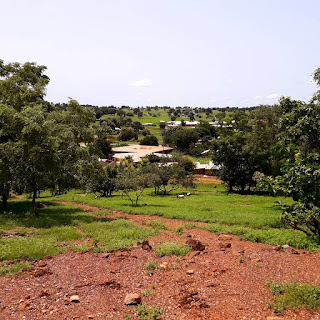One Month in Kongo
 |
| Kongo Village - Home for the next 6 months |
It has been
a little over one month since arriving in Ghana and starting as a Mondo and EU Aid Volunteer. Let’s
cover some basics before getting into the nitty gritty: The spiders are big,
the food is spicy, the mosquitoes have an unhealthy attraction to me, and there
is a very adorable kitten that keeps stealing our bread. But I love
it. It’s always a pleasure to come across a people so sincerely welcoming and inclusive,
even more so when you meet those people in a place so naturally beautiful
as this.
The weather is hot and humid, but, despite my poor Irish skin being burned more often than not, it is also quite manageable. Somewhat unexpectedly, according to the locals, we are still in the rainy season. Over the past few years the lines between the wet and dry seasons have become more blurred and less predictable. It has big knock-on effects for the local economy which is heavily reliant on farming. Farmers have become unsure as to when to begin planting crops after the dry season (due to ‘false’ first rains) and are delayed in harvesting crops at the end of the wet season because of prolonged rains. Many of the households in Nabdam District are reliant on farming (usually tomatoes, corn or millet) as the primary source of income, and may make as little as 5 Cedis, about €0.80, per day. Other common family occupations include seamstress, trader and mechanic. To put life here into some perspective, the 2010 Ghana Poverty Mapping report showed that 63% of the population of Nabdam District were living below the poverty line.
Households
tend not to be small either. Even if a couple don’t have many children, it’s
common for extended family to live in the one house. Resources are stretched thin
and so families have to make priorities. Unfortunately, children’s education is
often one of the things to suffer in these scenarios. While basic education
might be ‘free’, families still lack funds to provide necessary school
materials, such as pens, pencils, notebooks, uniforms, footwear, etc. This has
been one need which Mondo has focussed on providing for.
 |
| Preparing the school supplies for the sponsored children |
Every year,
approximately 130 children are individually sponsored by Estonian donors. The
children are selected based on the financial situation of the household,
usually with a focus on children who are orphans or come from single-parent
households. €50 is donated which is used to provide the materials mentioned above,
with the remaining money for each child being given in cash. When I first
learned about how the programme worked, I was sceptical. How much of a
difference could €50 really make in whether or not a child receives an
education. It turns out my scepticism was completely misplaced. That €50 makes
ALL the difference. It could be the equivalent of 1 or 2 months’ worth of
income for some families.
 |
| Children from the Mondo Sponsored Support Programme receiving their school supplies |
Let’s not
pretend that this support will suddenly lifting these families out of poverty –
it won’t. Children are still going to school hungry. They still spend their
free time working in the markets or on the farms. They still can’t buy
textbooks to study. Yet, for most of them, the sponsorship is the only thing
giving them any opportunity to get an education. Without it, it just would not
be possible. It’s a bittersweet feeling to meet these children and see the
potential that they have. They are smart. They are talented. They work hard.
And, above all else, they are generous with what they have. They are children
who, had they grown up in a different environment, could have been superstars
at whatever they did. In the best cases, programmes like this are giving them
the chance to realise that potential, and in the worst cases, offering them a
solid educational base to live the rest of their lives off.
It’s not
uncommon here for kids to get mocked or bullied for raggedy uniforms or for not
having school supplies. I actually feared that the support children would also
be bullied for being ‘poor’. Again, I couldn’t have been more wrong! In fact,
from what I’ve seen, pretty much every kid here wants to be a ‘Mondo child’.
 |
| Focus group discussion with some recent Senior High School graduates and former Mondo beneficiaries |
I know not
everyone here shares the same opinion of education as I do. And given the
situation, how could I expect them to? Schools won’t be putting food on the family
table today, but a day’s work on the farm might mean not worrying about
breakfast tomorrow. In the ideal world every child would receive an education
without being restricted by finances or hunger, but that is simply not the
world we live in right now. These are legitimate concerns that need to be
addressed seriously and taken into account when we encourage education to be a
priority.
It is still
early days for me and I’m always learning more about the culture and the
people. It’s different here, sure. We live life at different paces. We practice
different customs. We have different values. But the thing I’m coming to
appreciate the most about being here, about being anywhere in the world, is
that we share far more in similarities than we do in differences.
Comments
Post a Comment